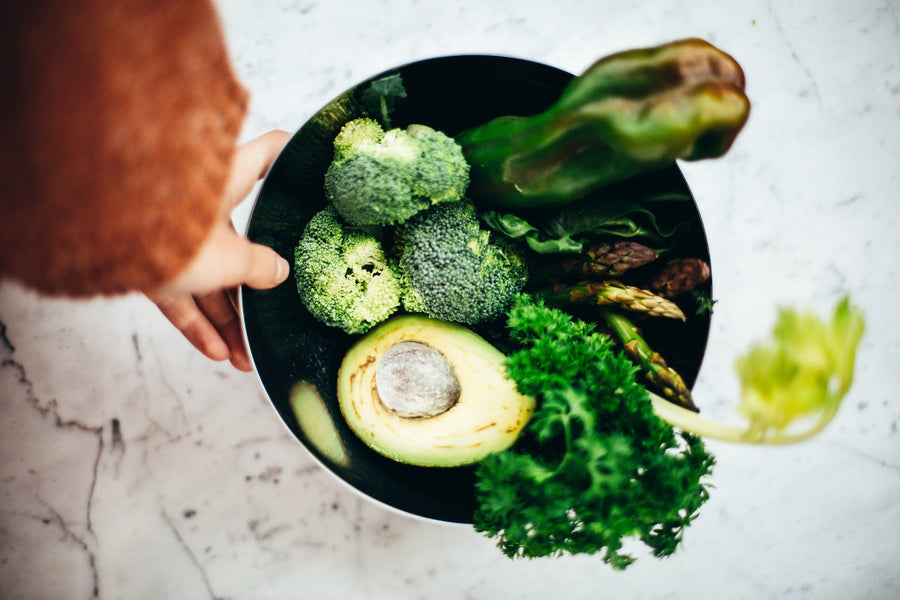What’s the Best Diet for Getting Pregnant?

Are you trying to get pregnant and wondering if you need to change up your diet? Is there a diet out there that will help increase your chances of getting pregnant? In this article, we’ll discuss the truth about dieting and conception.
So you’re ready to have a baby! Maybe you’ve already read the parenting books, emptied out your office to make space for a nursery, swapped out your old lube for a fertility-friendly lube, and now you’re wondering what you should be eating to enhance your fertility. The short answer: there’s no magic diet or meal prepping that’ll get you pregnant immediately, but there are some small changes you can make to ensure your body is in optimal health for a baby.
In general, diets don’t work
Contrary to what you’ve heard and probably not the answer you’re looking for, research shows that diets really don’t work. Sure, if you decide to cut out carbs, processed sugars, and unhealthy fats, you’d see a weight reduction. Long term, however, the weight will likely come back, you’ll be missing key nutrients in your diet, and you’ll be at risk of creating a negative relationship with food.
If you are already pregnant or are trying to conceive, losing weight quickly can put a lot of strain on your body and can actually be unhealthy for your baby.
Overall health is what’s important
It is important to know that your chances of getting pregnant and maintaining a healthy pregnancy can be affected by your weight. Your BMI, or body mass index, is one way of measuring if you are under or overweight for your height. BMI is widely used in studies and public health policies because of its ability to easily categorize groups, though it is a controversial and sometimes flawed measurement, especially for people of color. In general, though, being underweight or overweight can make it more difficult for you to conceive.
If you do get pregnant, an unhealthy weight can add risk to the pregnancy. Being underweight puts you at a higher risk of preterm labor and having a baby with a low birth-weight. And being overweight puts you at a higher risk of preeclampsia, preterm labor, gestational diabetes, and more.
Your physical health focus should be on a non-diet approach, with pregnancy-safe exercise, and a quality, comprehensive prenatal vitamin.
What does a non-diet approach mean?
A non-diet approach allows you to trust yourself and your body while avoiding dangerous and unhealthy behaviors and patterns associated with dieting. Essentially, you give yourself unconditional permission to eat whatever you’d like (if it’s pregnancy safe, that is) whenever you’re hungry. The key is to listen to hunger and fullness cues and to pay attention to how certain foods make you and your body feel!
What is a fertility diet?
There are some dietary recommendations that could enhance your chances of getting pregnant and maintaining a healthy pregnancy. It’s important to note, however, that there isn’t a special diet that will magically get you pregnant. There are fertility-friendly foods that contain fertility promoting nutrients (like folate or zinc), but that’s about as close as you can get to achieving a “fertility diet.”
The main reason fertility diets are recommended is to encourage clean and balanced eating, which improves your overall health. Dr. Audrey Gaskins details all the ways your environment and diet can impact your fertility in this article, but here’s the short and sweet summary:
- Try to incorporate two servings of whole grains into your diet everyday.
- Ensure your diet is full of fruits and vegetables.
- Try to consume low-mercury, omega rich foods multiple times a week. (Or try an omega-3 supplement.)
- Take a daily prenatal vitamin.
Along with the list of foods you should eat, there are some foods you should try to avoid. These include:
- Fast food and highly processed food
- High mercury seafood
- Excess caffeine—the research is mixed, but we do know that moderate caffeine consumption is safe; just be weary before making another cup of coffee.
"I have PCOS, Endo, & Hashimotos… Where do I begin with my diet?"
It is well-known that nutrition can help mitigate some of the common symptoms experienced with the above endocrine disorders. Sadly, endometriosis data is a bit more conflicting.
For Hashimotos, try a diet with minimal dairy, limited gluten and grains, and focusing on foods that are considered anti-inflammatory. Check with your endocrinologist regarding the autoimmune protocol diet.
Out with the diet pills, in with the prenatal supplements
One of the most beneficial changes you can make to your diet is to start taking a prenatal vitamin. For adequate nutrition, it’s best to find a daily prenatal that contains at least 800 mcg of folate, 15 mcg of vitamin B12, and 1000 IU of vitamin D. (The Natalist Prenatal meets this criteria!)
Another recommended supplement for both male and female fertility is Coenzyme Q10. CoQ10 is an antioxidant that has reproductive health benefits for both women and men. Some of these benefits include:
- Improving egg quality for women over 35.
- Improving IVF outcomes
- Support and improve sperm health
- Enhances the mitochondrial function in eggs
There isn’t one diet or meal plan that works for everyone trying to conceive, but it is important to fuel your body with healthy foods. Maintain a balanced diet full of veggies, fruits, healthy fats, protein, and grains and don’t forget your daily prenatal vitamin!
Reach Out, We're Here
Have questions about your order or products? For the speediest answer, check out our FAQ section. Need something else? Come find us below.
Please keep in mind our regular business hours; Monday-Friday, 9am-5pm CT.
Customer Support
support@natalist.com
Press Inquiries
media@everlyhealth.com
Business & Partnerships
team@natalist.com
Affiliates + Influencers
team@natalist.com
Job Openings
Careers Page























